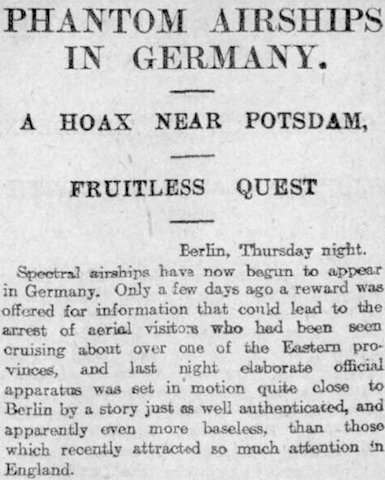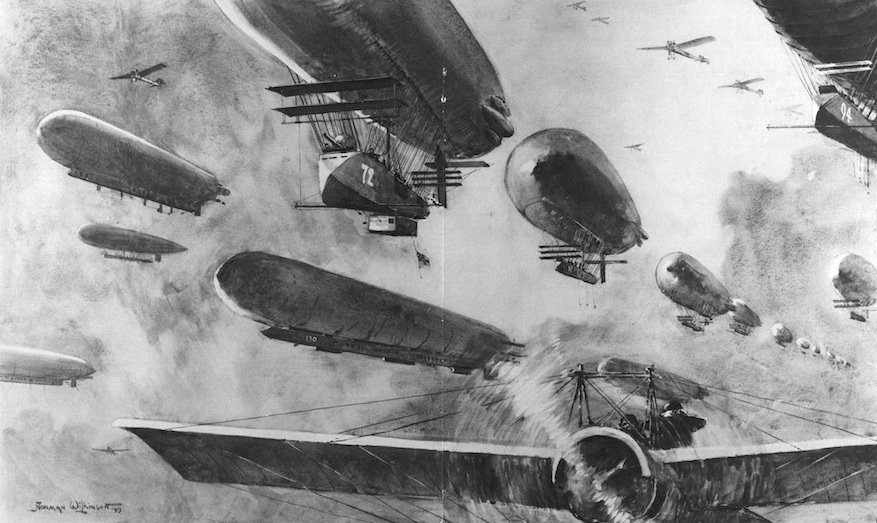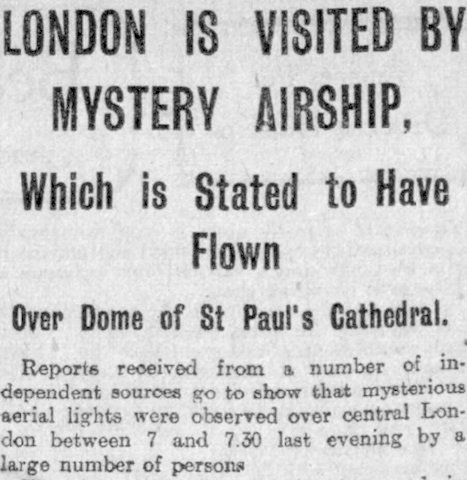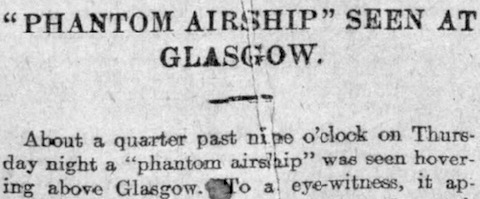
A few more details have emerged about the mystery airship crash near Caputh in Germany, thanks to the report of the Daily Telegraph‘s Berlin correspondent (reprinted in the Aberdeen Daily Journal, p. 5; above):
It was shortly after nightfall that two women returned from work in the fields to Caputh, a large village some miles to the west of Potsdam, with a tale that they had seen an airship catch fire and blow up over a vast fir forest that covers the greater part of that district. As they both have a high reputation for intelligence and veracity, and as they described what they had seen with complete unanimity, no one seems to have thought of doubting their word. The close circumstantiality of their narrative was also very convincing. They said the exploded airship was very similar to the Hansa, which has for some time been stationed in Potsdam, and which they had repeatedly seen. The vessel, they stated, had two cars, and while they were watching it a black cloud of smoke suddenly rose from one of these. Then flames appeared, and quickly enveloped the hill of the airship, which began to fall rapidly towards the earth. Just before it reached the tree-tops one of the cars became detached, and the vessel, thus lightened, soared rapidly upwards.
‘It was particularly this last detail’, the Telegraph‘s correspondent says, ‘which convinced the local authorities that the tale was true’; though since the women had ‘repeatedly’ seen a real airship in flight it seems quite possibly that they had seen the effects of a ballast dump. It anyway seems quite clear that there was no airship, since none are missing and none were found, and so
the women must have been either the victims of an illusion or the authors of a hoax. The former view seems to be generally taken, and there is a good deal of speculation as to what was the burning object which it is believed they actually did see. One theory is that it was a registering fire balloon, such as was responsible for a good deal of the airship mystification in England; but the most favourite hypothesis appears to be that what they took to be an airship was a military aeroplane, which in reality did pass over Caputh about the time of the vision, en route from Doberitz to Leipzig. It is no uncommon thing for the motors of flying machines to emit considerable quantities of smoke, and the flames are supposed to have been nothing more serious than sparks from the exhaust, which probably looked a little terrifying in the gathering darkness.
As the Telegraph‘s correspondent notes, recently ‘a reward was offered for information that could lead to the arrest of aerial visitors who had been seen cruising about over one of the Eastern provinces’, and the Caputh story is ‘just as well authenticated, and apparently even more baseless, than those which recently attracted so much attention in England’.
If a phantom airship scare does develop across the North Sea, the Germans can probably expect both sympathy and sarcasm from the British press. The Western Times, in the course of an editorial rejecting calls from the ‘new league’ (presumably meaning the Aerial League, established 1909) ‘started with the object for forcing the Government to an immediate allocation of £1,000,000 for the provision of air craft’, says that (p. 2)
The airship scare has made us a laughing stock for the world. One of the German comic papers — and well it might — makes play at us in this regard. The hoaxing which has been so largely indulged in indicates how the fears of a large proportion of the community have betrayed them.
Better ‘to go along quietly, and work out through experience the type of air craft best suited to our needs, instead of wasting a lot of money by building in a panic’. In any case, being first isn’t always an advantage: the airship industry in Germany is in serious trouble (Zeppelin has had ‘to treble the sum formerly charged’ for each airship, for example), while ‘We were, at first, all behind in the matter of motor-cars, but are not so now’.
Over in Ireland, the Leitrim Observer also has a leading article which discusses the phantom airship scare, entitled ‘Seeing is believing’ (p. 2):
When those who did not see the mysterious airship which has been scaring folk in various parts of the country expressed doubt as to whether there was any such thing to be seen they were promptly squashed by others who said, ‘But I saw it.’ There was no getting over that. They had seen it, seen its lights, its shape, and followed its course through glasses. Therefore they knew. From Yorkshire, Ipswich, Portsmouth, and other places came reports of the sinister fly-by-night.
The scareships became a cause célèbre, with partisans on both sides and everyone else confused in the middle:
The papers and the people excitedly discussed the affair. It was proved (nearly) that the Germans had quite a number of airships which could cross the North Sea, scare Englishmen out of their wits, and get back home in the darkness, so that nobody besides the crew would know they had been on a voyage at all. It was also proved that nothing of the sort could possibly happen. Even those people who are least subject to scares hardly knew what to believe when the reports kept coming in.
Then ‘the mysterious airship turned out to nothing more mysterious than a fire-balloon, or a number of fire-balloons’.
Some practical joker has evidently been having a fine game all to himself. If he only waits patiently he will be able to enjoy himself in the same way in a few months hence, for the people who have seen the airship this time will believe they see it again whenever there is an unusual light in the sky.
The reference to ‘Englishmen’ presumably is meant to include the Scots, Welsh and Irish too, because by now every part of Britain has been visited by airships of unknown origin.
It seems that scareships are an easy target now. From Punch (quoted in the Grantham Journal, p. 7):
It is stated that a queen wasp has been seen near Stroud. After the recent mistakes as to mystery airships, we shall not be surprised to find this turning out to be a Suffragette.
And at a Liberal meeting at Bootle Town Hall last night, Hamar Greenwood, MP, attacked the conscription movement as being politically motivated, according to the Liverpool Echo (p. 5):
The men who were always seeing airships at night, hearing submarines [?] both by day and by night, and prophesying invasion, were men who were determined to get rid of the present Government by any method they could think of (laughter).
It’s hard to be a scaremonger, sometimes.
![]() This work is licensed under a Creative Commons Attribution-NonCommercial-NoDerivatives 4.0 International License.
Permissions beyond the scope of this license may be available at http://airminded.org/copyright/.
This work is licensed under a Creative Commons Attribution-NonCommercial-NoDerivatives 4.0 International License.
Permissions beyond the scope of this license may be available at http://airminded.org/copyright/.






An addendum to the bit about Zeppelins getting more expensive: according to the Dundee Courier (drawing on the Berliner Tageblatt), the price was only to double, not treble, from £25,000 each to £50,000. A handy little factoid to bring out at parties, etc.